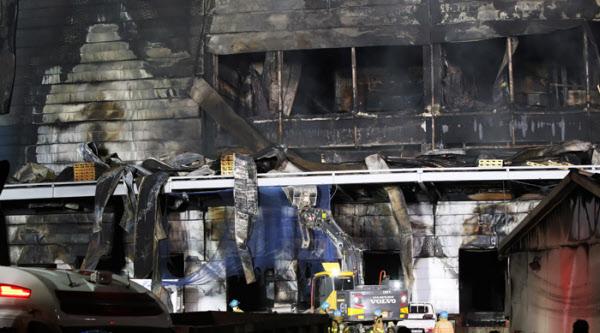 |
| ▲Icheon Warehouse Fire in 2020 (https://m.chosun.com/svc/article.html?sname=news&contid=2020043000323) |
On April 29th, there was a fire in the warehouse's new construction site in Icheon, Gyeonggi-do. Police and fire authorities believe that a welding spark lit an oil mist. This fire spread to combustible material, creating a lot of poisonous gas. The incident resulted in 38 deaths, 4 missing, and 10 injured. After this incident, the Ministry of Land, Infrastructure, and Transport reinforced regulations on combustible construction materials and examined how workers of subcontractors get benefits from industrial accident insurance. Also, the ministry tried to legislate special construction safety laws which give generalized rules from design to construction.
Fire, unsafe buildings, and accidents similar to the accident at the warehouse are never ending in Korea. In the 2008 January Icheon Warehouse Fire 40 people died. In particular, many media sources said that the welding flame and sandwich panel which caused the 2020 fire also caused the 2008 fire. But there was no clue of welding fire on white paper from Icheon Fire station in 2008. The evidence shows that there was a low possibility that welding work caused the fire in 2008. Instead, the combustible steam used during the construction was the most likely cause of the massive disaster. If a welding flame was the cause, then the welder is responsible. On the other hand, if the combustible steam is the cause, then the contractor is responsible for not installing facilities for ventilation. In other words, the media reports seem to be in favor of the construction company.
There have been other cases of poor workplace safety conditions in Korea. In 2007, a worker died from leukemia while working at Samsung’s semiconductor factory. Leukemia has been diagnosed in dozens of workers at the factory. The plant worked with 6 types of carcinogens and about 40 types of toxic materials, but workers were not given safety training and there weren’t adequate safety inspections. The victims filed an industrial accident lawsuit, but Samsung said it would not accept responsibility for the industrial accident even if it compensated the victims. After the lawsuit, the victims were recognized as victims of an industrial accident after 10 years. Throughout the lawsuit, pro-business media downplayed the case by silence at the beginning. According to the Sugang University Press Culture Research Institute, SBS reported only one case for three years from 2007-2009, and the article said that the semiconductor factory was not related to leukemia. In 2010, nine articles were reported, all of which represented Samsung’s position. The press blatantly sided with Samsung.
Corporations and the government are responsible for health and safety. The main causes of accidents are non-compliance with industrial regulations and an insufficient legal system. 90% of industrial accidents are caused by the employer’s violation of the Industrial Safety Law. According to the Ministry of Employment, in 2009, 131 violations of the Industrial Safety and Health Act (ISHA) were found in 80% (40 locations) of Daewoo E&C construction sites, which had seven industrial accidents. However, the punishment for corporations is low. In 2013-2017, among the cases of violations of ISHA, the courts only sentenced 2.9% with imprisonment, and 90.7% with probation or fines. Courts have been consistent with light punishments and the recidivism rate of breaking ISHA laws has reached 76%.
What about the U.K., the country of the industrial revolution? The U.K. handles most industrial accidents through the Health and Safety at Work Act (HSWA), which was created in 1974. Before HSWA, the government took responsibility for work safety and protection, but after HSWA, each industry is responsible for worker protection. In particular, about 1,000 construction companies make their own plans for the construction company’s consideration (CCS) and dispatch their own supervisors to check the implementation of safety regulations. Companies in the U.K. are focusing on safety rather than cutting costs, and they are proud of their thorough industrial safety management.
To prevent recurring industrial accidents and to create a world where workers can work safely, the media, the government, and companies should all be held accountable. The media should deliver only exact facts, not speculative articles or misinformation. The government should move away from only addressing accidents after they have happened. Practical and institutional measures should be prepared to address the industrial accidents that have occurred so far. Companies should strengthen their own safety regulations and take responsibility for risks.
By Choi Yuri, cub-reporter y0uuri@naver.com
<저작권자 © The Campus Journal, 무단 전재 및 재배포 금지>

 Shrinkflation, Consumer Deception
Shrinkflation, Consumer Deception




